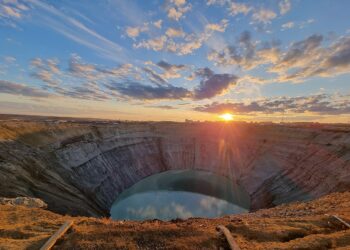
In 1953, chemists Harold Urey and Stanley Miller conducted one of the most famous experiments of the past century, commonly known as the primordial soup, in which they tried to find out how the first sings of life on Earth surfaced by exposing a mix of gases to a lightning-like electrical discharge to create amino acids. Amino acids are very important because they form proteins, which, in turn, form cellular structures and control reactions in living things.
Five years later, in 1958 Miller tried another variation to his experiment by adding to his initial variant hydrogen sulfide, which is spewed by volcanoes. For some reason, the chemist never got around to analyze his results and for last five decades the vile has been shelved away. Jeffrey Bada, Miller’s former student and a Scripps Institution of Oceanography, UC San Diego professor of marine chemistry, discovered the hydrogen sulfide variant of the experiment in Miller’s old lab after he inherited it (Miller passed away in 2007) and analyzed the data with modern equipment and techniques.
The results were remarkable! While Miller’s initial famous experiment concluded the mixture will turn up five organic molecules (amino acids), but the hydrogen sulfide compound combined with light delivered a staggering number of promising molecules: 23 amino acids and four amines, another type of organic molecule. This suggests that volcanic eruptions coinciding with lightning may have played a role in synthesizing a large number of crucial life molecules, and that there may have been a much more abundant variety of organic compound in the early Earth than scientists initially believed.
“Much to our surprise the yield of amino acids is a lot richer than any experiment [Miller] had ever conducted,” says Bada.
Another remarkable finding is that the amino acids in the hydrogen sulfide experiment very much resembles the ones found in asteroids, according to Bada.
It’s somewhat strange trying to figure out why Miller never went around to analyze this sample, but Eric Parker, part of Bada’s team, believes that the “rotten egg”-like odor of hydrogen sulfide is responsible for the shelving.
“When I was working with them by hand I could smell them myself,” Parker said. “It wasn’t so strong that it was overpowering, but it was strong enough to convince me to not stick my nose in front of it again.”
Unpleasant odors aside, the experience was a memorable one.
“It is sort of surreal to hold the sample vial in your hands and look at Stanley Miller’s handwriting on the label,” Parker said. “It was a very unique opportunity to go back in time and look at what he did and be able to use modern analysis techniques to be able to analyze samples produced over 50 years and see what they still contain today.”






